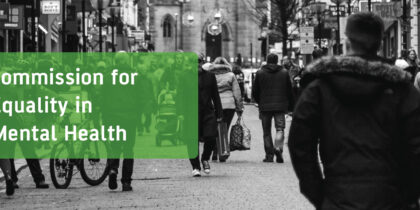By Andy Bell
This week the Government published its long-awaited strategy for its ambition to ‘level up’ the UK. The white paper is wide-ranging, covering topics as diverse as economic development and devolution, digital connectivity and housing. But what does it mean for our mental health? And what will be needed to ensure that the promise of ‘levelling up’ makes a difference to the public’s mental health and the lives of people with mental health difficulties?
The white paper says very little directly about mental health. While one of the 12 ‘missions’ the document seeks to achieve by 2030 is an improvement in ‘wellbeing’ in every area, unlike the other 11 objectives, it provides no detail about how this will be addressed.
Nonetheless, we know that our mental health is influenced by decisions made across government. Decisions about the economy, education, the built environment and justice all have a big impact on our chances of having good or poor mental health. As the Centre’s Commission for Equality in Mental Health (2020) found, reducing inequalities in mental health is about much more than tackling inequities in mental health care. It’s about reducing poverty and financial inequality, tackling discrimination and oppression, and creating opportunity and fairness in the labour market.
Despite setting a ‘mission’ to improve healthy life expectancy and reduce gaps between areas, the white paper has few ideas about how this will be achieved and fails to recognise the entrenched structural inequalities that shorten people’s lives and undermine their health from infancy onwards.
From that perspective, the white paper has some positive ideas. Boosting economic development in deprived areas, regenerating towns and cities, improving access to green spaces, and extending digital connectivity can all play a part in supporting better mental health. The pledge to tackle poor quality housing through a Decent Homes Standard and ending ‘no fault evictions’ could also help to address housing insecurity for people in the private rented sector. And boosting adult education and lifelong learning can be important for many people who missed out on educational opportunities earlier in life.
But there are significant gaps in the white paper. There is little recognition of the importance of poverty and wealth inequality, and no policy pledges to improve the social security system. Racial injustice and inequality are notably absent, despite their toxicity to mental health and life chances. The white paper notes the importance of schools to levelling up, but focuses solely on academic teaching rather than on how schools can promote wellbeing and life skills. There are no specific pledges relating to social housing, and the policies it proposes to prevent and punish crime offer very little to address the causes of offending or rehabilitate people who have offended.
Without a concerted and systemic approach to rooting out the causes of mental health inequality, ‘levelling up’ will struggle to bring about the improvements in wellbeing that it seeks to establish.
The white paper does make some pledges on public health, but they are very limited. Despite setting a ‘mission’ to improve healthy life expectancy and reduce gaps between areas, the white paper has few ideas about how this will be achieved and fails to recognise the entrenched structural inequalities that shorten people’s lives and undermine their health from infancy onwards. And with public health funding to local councils having been cut by 24% since 2013 and facing below-inflation settlements for the next three years, there is little prospect of action at the scale necessary to boost life expectancy or reduce health inequalities.
Overall, the white paper presents a limited vision for ‘levelling up’ that may bring some benefits to people’s mental health but which misses opportunities to address the social and economic causes of inequality and injustice. Without a concerted and systemic approach to rooting out the causes of mental health inequality, ‘levelling up’ will struggle to bring about the improvements in wellbeing that it seeks to establish. Better mental health cannot just be a coincidental by-product of levelling up policies. It needs to be embedded as an explicit priority, backed up by action designed to equalise mental health across policy areas and government departments. The Government’s proposed new mental health plan and promised white paper on ‘health disparities’ will need to be far-reaching and ambitious to ensure that ‘levelling up’ really makes a difference to wellbeing nationwide.








